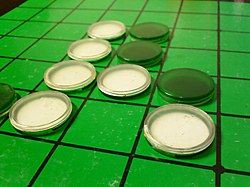Reversi
 |
|
| Years active | Since 1883 (perhaps earlier) |
|---|---|
| Genre(s) |
Board game Abstract strategy game |
| Players | 2 |
| Age range | 5+ years |
| Setup time | < 10 seconds |
| Playing time | 5–60 minutes |
| Random chance | None |
| Skill(s) required | Strategy, tactics, observation |
| Synonym(s) | Othello |
Reversi is a strategy board game for two players, played on an 8×8 uncheckered board. There are sixty-four identical game pieces called disks (often spelled "discs"), which are light on one side and dark on the other. Players take turns placing disks on the board with their assigned color facing up. During a play, any disks of the opponent's color that are in a straight line and bounded by the disk just placed and another disk of the current player's color are turned over to the current player's color.
The object of the game is to have the majority of disks turned to display your color when the last playable empty square is filled.
Reversi was most recently marketed by Mattel under the trademark Othello.
The game Reversi was invented in 1883 by either of two Englishmen (each claiming the other a fraud), Lewis Waterman or John W. Mollett (or perhaps earlier by someone else entirely), and gained considerable popularity in England at the end of the nineteenth century. The game's first reliable mention is in the August twenty-first 1886 edition of The Saturday Review. Later mention includes an 1895 article in The New York Times: "Reversi is something like Go Bang, and is played with 64 pieces." In 1893, the well-known German games publisher Ravensburger started producing the game as one of its first titles. Two 18th-century continental European books dealing with a game that may or may not be Reversi are mentioned on page fourteen of the Spring 1989 Othello Quarterly, and there has been speculation, so far without documentation, that the game has even more ancient origins.
The modern version of the game — the most regularly used rule-set, and the one used in international tournaments — is marketed and recognized as Othello. It was patented in Japan in 1971 by Goro Hasegawa (autonym: Satoshi Hasegawa), then a 38-year-old salesman.
There are two differences from the original game:
Hasegawa established the Japan Othello Association on March 1973, and held the first national Othello championship on April 4, 1973 in Japan. The Japanese game company Tsukuda Original launched Othello in late April, 1973 in Japan under Hasegawa’s license, which led to an immediate commercial success.
...
Wikipedia
